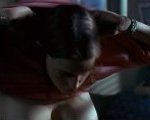
Lost and Delirious (2001)
Año de lanzamiento: 2001
Nación: Canada
Alternative Title: Lost & Delirious, Rebelles, Assunto de Meninas, El último suspiro, Kayip ve çilgin
Director: Léa Pool
Writer: Judith Thompson, Susan Swan
Producción & Género
Productor: Producer: Greg Dummett, Lorraine Richard, Louis-Philippe Rochon
Executive Producer: Louis Laverdière
Compañías: Cité-Amérique, Dummett Films
Género: Coming-Of-Age Fiction, Drama, Film Based On Literature, Lgbt-Related Film, Romance, Romance Film
Budget: N/A
Premios & Similares
Premios:
Similar:
Palabras clave
Palabras clave: based on novel or book, discovery, identity, lesbian, love, roommates, school, woman director
Historia
Lost and Delirious follows a teenage girl named Mary (Mischa Barton) as she starts her education at an elite boarding school. She bonds with her two older roommates, Gidge (Piper Perabo) and Toby (Jessica Pare), who are in a secret romantic relationship. The story revolves around the complicated dynamics of their friendship triangle when Mary discovers the nature of Gidge and Toby's relationship. The narrative explores themes of love, jealousy, and self-discovery as Mary navigates her feelings for both women while trying to maintain her friendships with them.
Resumen
Lost and Delirious is a 2001 coming-of-age drama directed by Léa Pool. Based on the novel 'The Diviners' by Canadian author Elizabeth Jane Howard, the film provides a snapshot of adolescence, sexual awakening, and identity formation within an exclusive boarding school setting. The story focuses on the complex emotional landscape of three teenage girls – Mary, Gidge, and Toby – as they grapple with love, friendship, and self-discovery. The film stands out for its exploration of lesbian relationships in a mainstream context, offering a sensitive portrayal of the characters' experiences.






